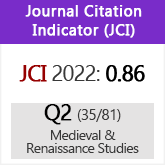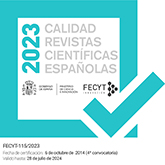The Fazienda de Ultramar and the Contribution of the Vulgate
DOI:
https://doi.org/10.3989/aem.2023.53.1.03Keywords:
Hebrew Bible, Vulgate Bible, Fazienda de Ultramar, sources, translationAbstract
The first editor of the Fazienda de Ultramar, Moshé Lazar, was the first to determine that the Biblical parts included in this work were taken from a Hebrew original. In his pioneering 1965 edition of the Fazienda, Lazar included numerous footnotes in which he established correspondences between specific passages or words in the Fazienda and the Hebrew Bible. However, Lazar often skipped over those parts in which this work follows the Vulgate, obscuring the relationship between both works. This paper will prove that the Fazienda’s debt to the Vulgate is greater than has been previously indicated, suggesting that the passages from the Old Testament included in the Fazienda were taken from two different sources: the Hebrew Bible and the Latin Vulgate.
Downloads
References
Amigo Espada, Lorenzo (1983), La Biblia romanceada y la Vulgata, in Oroz Reta, José (ed.), Corollas philologicas in honorem Iosephi Gvillen Cabañero, Salamanca, Universidad de Salamanca, pp. 35-54. https://doi.org/10.36576/summa.3086
Arbesú, David (ed.) (2011), La fazienda de Ultramar [online], http://www.lafaziendadeultramar.com [accessed: 01/03/2023].
Avenoza, Gemma (2012), The Bible in Spanish and Catalan, in Marsden, Richard; Matter, E. Ann (coords.), New Cambridge History of the Bible. Vol. 2. From 600 to 1450, Cambridge, Cambridge University Press, pp. 288-306. https://doi.org/10.1017/CHOL9780521860062.018
Enrique-Arias, Andrés; Pueyo Mena, F. Javier (eds.) (2008), Biblia Medieval. Biblia Medieval, http://www.bibliamedieval.es [accessed: 01/03/2023].
Dodi, Amos (2004), Transcriptions of Hebrew Proper Nouns in a Fifteenth-Century Spanish Bible (Ms. Escorial I.j.3), "Bulletin of Hispanic Studies" 81/4, pp. 427-452. https://doi.org/10.3828/bhs.81.4.1
Enrique-Arias, Andrés (2011), Traduciendo la Biblia en la Castilla medieval. Nuevas perspectivas a la luz de la edición electrónica integral de los romanceamientos bíblicos medievales en castellano, "Letras de Deusto" 133/41, pp. 13-41.
Enrique-Arias, Andrés (2012), Biblia Medieval: diseño y aplicaciones de un corpus paralelo y alineado del español medieval, in Montero Cartelle, Emilio
Manzano Rovira, Carmen (coords.), Actas del VIII Congreso Internacional de Historia de la Lengua Española (Santiago de Compostela, 14-18 de septiembre de 2009), vol. I, Madrid, Arco Libros, pp. 421-432.
Hebrew-English Interlinear [online], http://www.scripture4all.org/Online Interlinear/Hebrew_Index.htm [accessed: 01/03/2023].
Hervey, Sándor; Higgins, Ian; Haywood, Louise M. (2008), Thinking Spanish Translation: A Course in Translation Methods: Spanish to English, London, Routledge.
Lazar, Moshé (ed.) (1965), La fazienda de Ultra Mar. Biblia romanceada et itinéraire biblique en prose castillane du XIIe siècle, Salamanca, Universidad de Salamanca.
Pueyo Mena, F. Javier (2008), Biblias romanceadas y en ladino, in Hassán, Iacob M.; Izquierdo Benito, Ricardo; Romero-Castelló, Elena (coords.), Sefardíes: literatura y lengua de una nación dispersa, Cuenca, Universidad de Castilla-La Mancha, pp. 193-263.
Requena Marco, Miguel (1974), La Fazienda de Ultra Mar: estudio de su problemática y correcciones al texto, Barcelona, Universidad Autónoma de Barcelona (degree thesis).
Sachs, George E. (1948-1949), Fragmento de un estudio sobre la Biblia medieval romanceada, "Romance Philology" 2, pp. 217-228.
The Complete Jewish Bible with Rashi commentary [online], https://www.chabad.org/library/bible_cdo/aid/63255/jewish/The-Bible-with-Rashi.htm [accessed: 01/03/2023].
Vulgate - Biblia Sacra. Iuxta Vulgatam versionem. Adiuvantibus B. Fischer, I. Gribomont, H. F. D. Sparks, W. Thiele (2005), Stuttgart, Deutsche Bibelgesellschaft.
Downloads
Published
How to Cite
Issue
Section
License
Copyright (c) 2023 Consejo Superior de Investigaciones Científicas (CSIC)

This work is licensed under a Creative Commons Attribution 4.0 International License.
© CSIC. Manuscripts published in both the printed and online versions of this Journal are the property of Consejo Superior de Investigaciones Científicas, and quoting this source is a requirement for any partial or full reproduction.All contents of this electronic edition, except where otherwise noted, are distributed under a “Creative Commons Attribution 4.0 International” (CC BY 4.0) License. You may read here the basic information and the legal text of the license. The indication of the CC BY 4.0 License must be expressly stated in this way when necessary.
Self-archiving in repositories, personal webpages or similar, of any version other than the published by the Editor, is not allowed.















